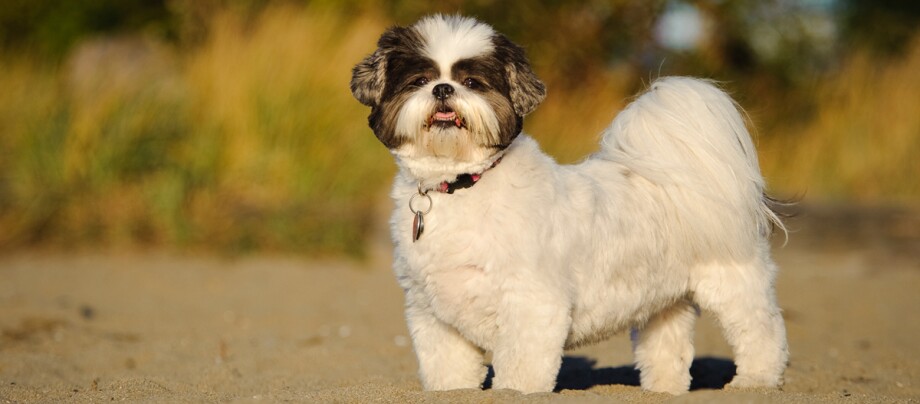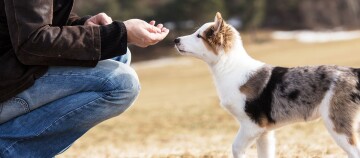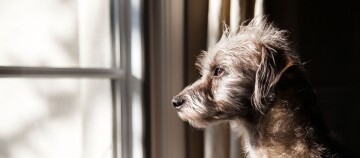Shih Tzu - the Fuzzy Temple Dog from the “Roof of the World”
05.01.2024 - Reading time: 3 minutes

According to legend, the Buddha owned a dog that had the ability to transform into a lion. The Shih Tzu comes very close to this, at least visually, with its sturdy build, rounded head and luxuriant coat. In terms of nature, however, the little dog has little in common with the wild cat: Shih Tzus delight with their cheeky, happy nature and affection. The lovable four-legged friends expect full attention from their humans.
NewsletterShih Tzu
Breed | Shih Tzu |
Origin | Tibet |
Classification | Society and companion dog |
Size | up to 27 centimetres |
Weight | 4.5 to 8 kilos |
Physique | strong, longer than high |
Eyes | protruding |
Ears | very hairy, floppy ears |
Coat and colour | silky, dense and long; mostly black, white, grey, reddish, golden; multicoloured coat permitted |
Special features | flowing, silky coat that does not shed much |
Nature | friendly, playful, affectionate, tends to be jealous |
Care | extensive coat care necessary, alternatively regular coat trimming |
Health | prone to complaints related to the head shape, such as dental and respiratory problems; sensitive to heat |
We have the best products for your Shih Tzu!
Old breed from Tibet
The origin of the Shih Tzus goes back a long way: Tibetan monks kept the animals as temple dogs as early as the seventh century. The breed was probably created by crossing small Lhasa Apsos with Pekingese. About a thousand years later, the Shih Tzu came into fashion among the Chinese nobility. After the Shih Tzu breed in China came to a standstill under the Maos, dog lovers from other nations took up the cause of preserving the breed. Since 1929, Great Britain has held the patronage for the recognised breed.
Nature of the Shih Tzu
Shih Tzus are friendly and affectionate dogs that always want to be the centre of attention and love to play and romp around. They make excellent family dogs, but also therapy animals. However, they are also said to have a certain „arrogance“, because the Shih Tzu maintains an independence that is rather expected from cats. He does not like to be dominated.
At the same time, the dog has mastered all the tricks to wrap his human around his paw and manipulate him. Don’t fall for the little charmer, otherwise he will mess around with you. The hunting instinct is only slightly pronounced.
Training and maintenance of the Shih Tzu
Due to their adaptability, Shih Tzus are suitable for indoor living as long as they get enough exercise every day and can explore their surroundings. They do not tolerate being alone; it is ideal if a family member is always around them.
Training the Shih Tzu is tricky. Many animals show a certain tendency to stubbornness, others are too playful to take training attempts seriously. A high degree of perseverance is therefore required. It can also take long to housetrain. In addition, there is a breed-typical peculiarity: Many Shih Tzus eat faeces; a habit that you should strictly prevent already during puppy training.
Caring for the Shih Tzu
Shih Tzus do not shed naturally: the smooth or slightly wavy top coat just keeps growing. To keep the coat silky, clean and tangle-free, you should brush it daily and have it trimmed regularly to a practical length. The inside of the legs and the ears are particularly at risk of matting.
You will need to put in more effort, if you prefer an exclusive long hairstyle for your Shih Tzu. The coat must be washed more often and treated with special grooming oil. It then falls silkily down the sides of the dog to the ground.
The top coat on the head should always be either tied up or trimmed, otherwise it may fall onto the dog’s eyes and irritate it.
Special features of the Shih Tzu
The short muzzle and overbite are associated with a number of factors that can cause health problems. Please take extra good care of your Shih Tzu on hot days: The dogs are prone to heat stroke, stays in blazing sun should be avoided. Furthermore, Shih Tzus are prone to problems with their teeth and breathing due to their short skull. Pedigree dogs such as a Shih Tzu should therefore only be purchased from a responsible breeder. The German Kennel Club (Verband für das Deutsche Hundewesen – VDH) can provide the relevant lists.





